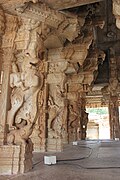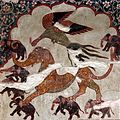Top Qs
Timeline
Chat
Perspective
Yali (mythology)
Hindu mythological creature From Wikipedia, the free encyclopedia
Remove ads
Yali (IAST: Yāḷi,[1] Tamil: யாழி), also called Vyāla (Sanskrit: व्याल),[2] is a South Indian mythological creature, portrayed with the head and the body of a lion, the trunk and the tusks of an elephant, and sometimes bearing equine features.[3]



Images of the creature occur in many South Indian temples, often sculpted onto the pillars.[4] There also exist variations of the creature, with it possessing the appendages of other beasts. It has sometimes been described as a leogryph (part-lion and part-griffin),[5] with some bird-like features, with the trunk referred to as a proboscis.[6]
Karuna Sagar Behera writes of the virala, or vidala (Sanskrit: vyala) in terms of a "mythical monster used [...] as a sculptural and architectural motif, the representation of vidala is of various types, e.g. gaja-vidala, nara-vidala, etc."[7]
Remove ads
Iconography
Descriptions of, and references to, yalis are ancient, but they became prominent in South Indian sculptures in the 16th century. Yalis were described to be more powerful than the lion, the tiger, or the elephant. In its iconography, the yali has a cat-like body, but the head of a lion with the tusks of an elephant (gaja), and the tail of a serpent. Sometimes, they have been shown standing on the back of a makara, another mythical creature and considered to be the vahana of Budha (Mercury). Some images look like three-dimensional representation of yalis. Images or icons have been found on the entrance walls of the temples, and the graceful mythical lion is believed to protect and guard the temples and ways leading to the temple. They usually have the stylised body of a lion and the head of some other beast, most often an elephant (gaja-vyala).[8] Other common examples are: the lion-headed (simha-vyala), horse- (ashva-vyala), human- (nir-vyala) and the dog-headed (shvana-vyala) ones.[9]
Remove ads
Symbolism
The yali is said to be a guardian creature, protecting human beings both physically and spiritually. It is regarded to be a fearless beast, possessing supremacy over the animal world. It is also believed to be the symbolic representation of man's struggle with the elemental forces of nature. It is even depicted in emblem of Karnataka[10]
Literature
Descriptions of the yali are featured in ancient Tamil literature, dating back to the Sangam era.[11]
Gallery
- The Yali is often found on the neck of a modern Saraswati veena.
- Yali in pillars of Puthu Mandapam, Madurai, Tamil Nadu State, India
- Yali in Thiruvannamalai Annamalaiyar Temple, Tiruvannamalai, Tamil Nadu State, India
- Yali pillars at Vittala temple at Hampi, Karnataka state, India
- Yali pillars at Ananthasayana temple, Ananthasayanagudi, Karnataka state, India
- Carved pillar in the 16th century Thousand Pillar Hall, Meenakshi Temple, Madurai
- Yali pillars at Krishna temple at Hampi, Karnataka state, India
- Yali pillars at Bhoganandishvara temple in Chikkaballapur district, Karnataka state, India
- Yali pillars at the Ranganatha temple in Chikkaballapur district, Karnataka state, India
- Pillars with Yali and Kudure Gombe ("horse doll") at Ranganatha temple, Rangasthala, Chikkaballapur district, Karnataka state, India
- Yali and rider, Mukteshvara Temple, Bhubaneshwar, Odisha state, India
- Yali and rider, Mukteshvara Temple, Bhubaneshwar, Odisha state, India
- Image of Yali at Orchha fort, Madhya Pradesh, India
Remove ads
See also
References
External links
Wikiwand - on
Seamless Wikipedia browsing. On steroids.
Remove ads













